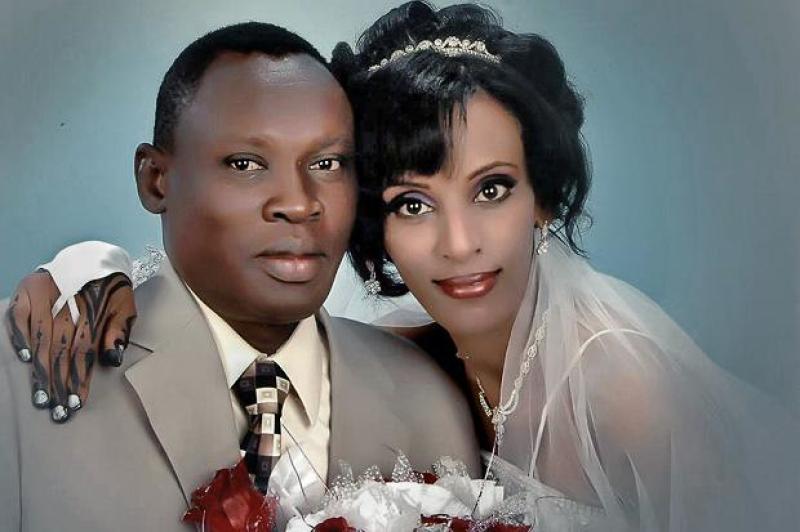

The Sudanese woman recently sentenced to death for not recanting her faith was the topic of a congressional hearing Wednesday, July 23 held by U.S. Rep. Chris Smith (NJ-04), Chairman of the House congressional panel that oversees global human rights issues.
"The world watched as Meriam Ibrahim Ishag, a pregnant Christian woman in Sudan, faced flogging and the death penalty because her government would not accept that she had lived her life as a Christian and married a Christian man," Smith said. "Meriam has demonstrated both courage and grace under pressure -- giving birth in jail in May while chained and caring for her two children, including her newborn, not only under restraints, but also without the normal amenities that any pregnant women and nursing mother should expect. The harsh application of sha'ria law on non-Muslims was the trigger for a two-decade civil war in Sudan and the eventual secession of the South. Sudan is one of 20 countries in the world who have laws against apostasy - defined as the abandonment by an individual of their original religion."
"The Troubling Case of Meriam Ibrahim," was the title of the hearing to be held before the House Foreign Affairs Committee's subcommittee on global human rights. The vice-chairman of the bipartisan U.S. federal government organization--the U.S. Commission on International Religious Freedom (USCIRF)-- led off testimony on the plight of the woman, who was pregnant and even forced to have her child born in prison while she was shackled.
Smith planned to have a hearing June 24 on the case, but postponed it because it appeared she would be released jail and leave Sudan. She was in fact released June 23, but was later rearrested when she tried to leave the country. She was released again and is now waiting to be allowed to leave the country.
"This hearing was originally supposed to take place in June, but at the urging of both the U.S. government and Sudanese officials, we postponed it to allow for quiet diplomacy to take place," Smith said. "However, Meriam's legal entanglements seem to be increasing rather than diminishing. We intend for this hearing to be an appeal to the Government of Sudan to use their legal authority to end the official entanglements Meriam has faced since her arrest in January and subsequent trial."
Testifying at the hearing were (click on name to read opening testimonies): Zuhdi Jasser, M.D., Commissioner, United States Commission on International Religious Freedom; Tony Perkins, President, Family Research Council; Grover Joseph Rees, Former General Counsel, U.S. Immigration and Naturalization Service, and, Omar Omer Ismail, Senior Policy Advisor, The Enough Project.
"The case of Meriam Yahia Ibrahim Ishag rightly has garnered international attention and condemnation and will continue to do so until she and her family are allowed to leave for freedom in the United States," said Jasser, noting he is a Muslim. "Hopefully this hearing will also draw attention to the ongoing violations of religious freedom in Sudan for which Sudan has been designated a 'country of particular concern' by the State Department since 1999."
"Though Sudan is certainly not the worst offender of religious freedom worldwide, the country historically has not had a stellar record on religious toleration," said Perkins, who noted the law under which Miriam was convicted was enacted in 1991. "Christians have been detained by the National Intelligence Security Services and church buildings have been demolished and vandalized."
Ismail that said across the country, the government of Sudan is the main perpetrator and culprit in the violence suffered by millions of Sudanese who the government considers enemies for no other reason than exercising their basic human right of freedom of religion.
"This government flaunts a brand of Islam and promotes a racial identity that is exclusive and divisive and is met with wide rejection and resistance among the majority of the Sudanese people," Ismail said. "In any democratic society that respects human rights, Mariam would not be considered a criminal because she would be granted the right to choose her own religion. The government of Sudan, however, not only ignores its citizens' human rights, it disrespects its own constitution and the laws drawn from it. According to the Sudanese Interim National Constitution of 2005, 'every person shall have the right to the freedom of religious creed and worship.' In spite of this, the practice of the government of Sudan is all but adhering to its contract with the Sudanese people."
Rees's testimony addressed whether the two children of Meriam Ibrahim and Daniel Wani are United States citizens who should be given appropriate documentation of their citizenship and afforded such protection and assistance as the government of the United States gives its citizens who are residing or visiting in other countries.



















